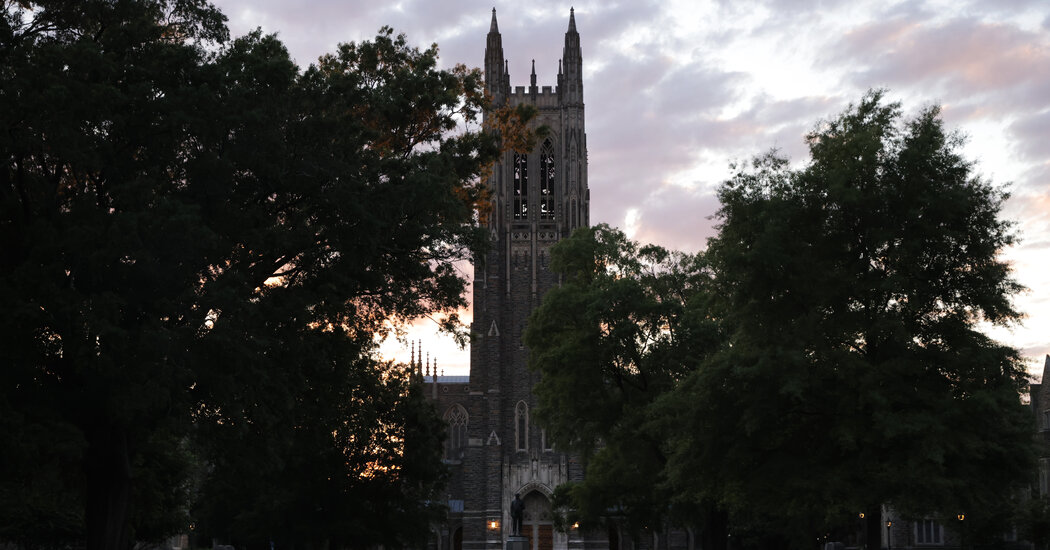The federal lawsuit against Yale, M.I.T. and other colleges is the latest legal action to question admissions practices.
A lawsuit filed in federal court on Monday accused 16 of the nation’s leading private universities and colleges of conspiring to reduce the financial aid they award to admitted students through a price-fixing cartel.
The lawsuit, filed in federal court in Chicago on behalf of five former undergraduates who attended some of the universities named in the suit, takes aim at a decades-old antitrust exemption granted to these universities for financial aid decisions and claims that the colleges have overcharged an estimated 170,000 students who were eligible for financial aid over nearly two decades.
The universities accused of wrongdoing are Brown, the California Institute of Technology, the University of Chicago, Columbia, Cornell, Dartmouth, Duke, Emory, Georgetown, the Massachusetts Institute of Technology, Northwestern, Notre Dame, the University of Pennsylvania, Rice, Vanderbilt and Yale.
The allegations hinge on a methodology for calculating financial need. The 16 schools collaborate in an organization called the 568 Presidents Group that uses a consensus approach to evaluating a student’s ability to pay, according to the lawsuit.
Under federal antitrust law, these universities are permitted to collaborate on financial aid formulas if they do not consider a student’s ability to pay in the admissions process, a status called “need blind.” The group’s name is derived from a section of federal law permitting such collaborations: Section 568 of the Higher Education Act.
The suit claims that nine of the schools are not actually need blind because for many years, they have found ways to consider some applicants’ ability to pay.
The University of Pennsylvania and Vanderbilt, for example, have considered the financial needs of wait-listed applicants, the lawsuit says. Other schools, the lawsuit says, award “special treatment to the children of wealthy” donors, which, given the limited number of spots, hurts students needing financial aid.
The lawsuit claims that the actions of these nine schools — Columbia, Dartmouth, Duke, Georgetown, M.I.T., Northwestern, Notre Dame, the University of Pennsylvania and Vanderbilt — render the actions of all 16 universities unlawful, turning it into what the suit calls “the 568 Cartel.”
“Privileging the wealthy and disadvantaging the financially needy are inextricably linked,” the suit said. “They are two sides of the same coin.”
Peter McDonough, vice president and general counsel of the American Council on Education, an industry organization whose 2,000 college and university president members include leaders of the 16 schools, said the case was similar to antitrust litigation the Justice Department filed against Ivy League schools and M.I.T. in the 1990s.
Ultimately, he said, M.I.T. obtained a favorable federal appeals court ruling and the Justice Department settled its claims.
“I’d be surprised to ultimately find that there’s fire where this smoke is being sent up today,” Mr. McDonough said, noting that the schools named in the complaint were “very antitrust aware and particularly sophisticated. They have good advice provided to them.”
Several institutions, including Columbia, Duke and Rice, declined to comment on the pending litigation. Karen Peart, a spokeswoman for Yale, said the university’s “financial aid policy is 100 percent compliant with all applicable laws.”
The lawsuit is merely the latest legal action that raises questions about the admissions practices at elite universities and colleges — including the Operation Varsity Blues scandal, in which wealthy and well-connected donors were shown to have bought their children’s admission to college, and claims that admissions at top-ranked universities are based on racial quotas.
A Supreme Court decision is believed to be imminent on whether the court will consider two cases on affirmative action in admissions, one against Harvard and another against the University of North Carolina-Chapel Hill.
Neither university is named in the financial aid lawsuit.
But the lawsuit stated that Harvard, among other universities, declined to join the 568 group because it “would have yielded financial-aid packages that were smaller than what Harvard wanted to award.”


























